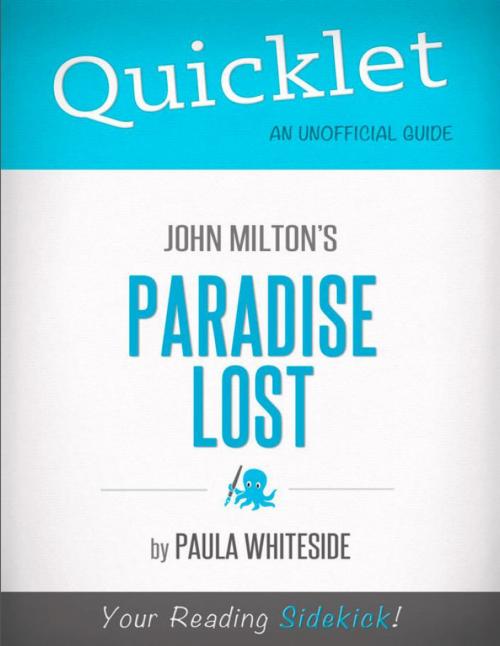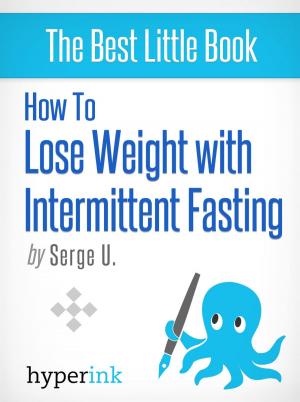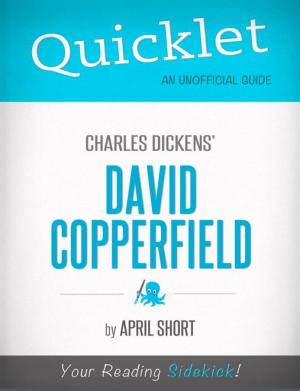Quicklet on John Milton's Paradise Lost
Nonfiction, Reference & Language, Study Aids, Book Notes, Art & Architecture, General Art| Author: | Paula Whiteside | ISBN: | 9781484006498 |
| Publisher: | Hyperink | Publication: | February 16, 2012 |
| Imprint: | Hyperink | Language: | English |
| Author: | Paula Whiteside |
| ISBN: | 9781484006498 |
| Publisher: | Hyperink |
| Publication: | February 16, 2012 |
| Imprint: | Hyperink |
| Language: | English |
ABOUT THE BOOK
For ages, writers and philosophers have sought to justify the inherent tragedy of death. Milton, the humanist poet, attempted to clarify the ways of a higher Being to His created subjects by proposing that there is a reason for evil: the transcendence of earthly temptation to an eternal relationship with the Godhead. In the everyday context, an oft-heard complaint, "Why do bad things happen to good people?" has its correspondence with another commonplace, "Everything happens for a reason." With Milton, it boils down to the Paulinian "Fortunate Fall" (felix culpa), where one must lose to discover what winning is all about; otherwise, there would be no contrast and no progress.
Indeed, after the apple from the tree of knowledge is shared, the couple embark on a carnal relationship, which hints at Milton's misogynistic view of women as the less brainy and more lustful sex. However, the tree of knowledge intercedes on the couple’s behalf, and mankind’s as well, with its “second root,” (Christ), who “shall absolve them who renounce Their own both righteous and unrighteous deeds, and live in thee transplanted, and from thee Receive new life.” Christ, the son, is willing to undergo humiliation and self-abnegation since no man can generate deeds that will save him, and Christ imputes man with enough merits to gain ultimate salvation.
MEET THE AUTHOR
Paula is currently a professional writer for oDesk and other Web content providers, as well as the copy editor for Wine Business Monthly, an international industry magazine located in the Sonoma Valley Wine Country. Her portfolio is available here: http://www.demandstudios.com/ContributorPromotion.mvc/EditPr
EXCERPT FROM THE BOOK
“Paradise Lost” was composed in unrhymed (blank) “English Heroic Verse,” and its structure is set up in interludes - invocations or proems. These prefatory statements, which give the history of the fall of mankind, appear in Books I, III, VII and IX and discuss the story’s genesis or evolution. The poem was originally conceived as a play, “Adam Unparadised,” and it would have begun with Satan’s soliloquy in Book IV. In these prefatory statements, Milton relates his proposition: to write about military prowess, similar to the theme in Edmund Spenser’s “Faery Queen.”
With his involvement in Cromwell’s regime, he redefined heroism through the character of Satan: martial valor and wiliness and, in doing so, debunks these traits. Satan refuses to accept that God is omnipotent since submission to God results in His deification. Satan’s primary argument to the first dwellers in the Garden of Eden is that God is tempting them with the tree of knowledge and its fruit, and by withholding this power, He is duplicitous. This is a striking example of syllogistic reasoning since Satan is the one actually doing the tempting but turns the argument upon itself.
The militaristic theme is most notable in Satan’s assembling his fallen angels into hierarchies yet allows them to plead their case regarding how to assail God in a democratic vein in Book II during “the great consult.” Since Satan realizes it’s a losing cause to do battle with God again, he advocates covert, as opposed to overt, war through the corruption of the newly-created beings on earth. The heavenly angels are also spoken of in martial terms, as “th’ Angelic Squadron bright” in Book IV. Milton’s anti-monarchical and anti-prelatical tendencies, from his Cromwell days, appear in Book V when Adam is described in his natural, naked state, upon meeting the angel Raphael, as “without more train Accompani’d than with his own complete Perfections, in himself was all his state.” Milton also exhibits his anti-Stewart sentiments in the angel Abdiel, “than whom none with more zeal ador’d The Deity, and divine commands obeyed,” who was the remnant of one who did not follow the other angels in their rebellion with God.
Buy a copy to keep reading!
ABOUT THE BOOK
For ages, writers and philosophers have sought to justify the inherent tragedy of death. Milton, the humanist poet, attempted to clarify the ways of a higher Being to His created subjects by proposing that there is a reason for evil: the transcendence of earthly temptation to an eternal relationship with the Godhead. In the everyday context, an oft-heard complaint, "Why do bad things happen to good people?" has its correspondence with another commonplace, "Everything happens for a reason." With Milton, it boils down to the Paulinian "Fortunate Fall" (felix culpa), where one must lose to discover what winning is all about; otherwise, there would be no contrast and no progress.
Indeed, after the apple from the tree of knowledge is shared, the couple embark on a carnal relationship, which hints at Milton's misogynistic view of women as the less brainy and more lustful sex. However, the tree of knowledge intercedes on the couple’s behalf, and mankind’s as well, with its “second root,” (Christ), who “shall absolve them who renounce Their own both righteous and unrighteous deeds, and live in thee transplanted, and from thee Receive new life.” Christ, the son, is willing to undergo humiliation and self-abnegation since no man can generate deeds that will save him, and Christ imputes man with enough merits to gain ultimate salvation.
MEET THE AUTHOR
Paula is currently a professional writer for oDesk and other Web content providers, as well as the copy editor for Wine Business Monthly, an international industry magazine located in the Sonoma Valley Wine Country. Her portfolio is available here: http://www.demandstudios.com/ContributorPromotion.mvc/EditPr
EXCERPT FROM THE BOOK
“Paradise Lost” was composed in unrhymed (blank) “English Heroic Verse,” and its structure is set up in interludes - invocations or proems. These prefatory statements, which give the history of the fall of mankind, appear in Books I, III, VII and IX and discuss the story’s genesis or evolution. The poem was originally conceived as a play, “Adam Unparadised,” and it would have begun with Satan’s soliloquy in Book IV. In these prefatory statements, Milton relates his proposition: to write about military prowess, similar to the theme in Edmund Spenser’s “Faery Queen.”
With his involvement in Cromwell’s regime, he redefined heroism through the character of Satan: martial valor and wiliness and, in doing so, debunks these traits. Satan refuses to accept that God is omnipotent since submission to God results in His deification. Satan’s primary argument to the first dwellers in the Garden of Eden is that God is tempting them with the tree of knowledge and its fruit, and by withholding this power, He is duplicitous. This is a striking example of syllogistic reasoning since Satan is the one actually doing the tempting but turns the argument upon itself.
The militaristic theme is most notable in Satan’s assembling his fallen angels into hierarchies yet allows them to plead their case regarding how to assail God in a democratic vein in Book II during “the great consult.” Since Satan realizes it’s a losing cause to do battle with God again, he advocates covert, as opposed to overt, war through the corruption of the newly-created beings on earth. The heavenly angels are also spoken of in martial terms, as “th’ Angelic Squadron bright” in Book IV. Milton’s anti-monarchical and anti-prelatical tendencies, from his Cromwell days, appear in Book V when Adam is described in his natural, naked state, upon meeting the angel Raphael, as “without more train Accompani’d than with his own complete Perfections, in himself was all his state.” Milton also exhibits his anti-Stewart sentiments in the angel Abdiel, “than whom none with more zeal ador’d The Deity, and divine commands obeyed,” who was the remnant of one who did not follow the other angels in their rebellion with God.
Buy a copy to keep reading!















